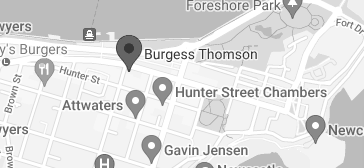Commercial Contracts
Business & Commercial
Newcastle's leading experts in legal advice
Commercial and business contracts are legally binding agreements between two or more parties which set out the rights and obligations of those parties concerning a particular transaction, arrangement or other business dealing. Commercial contracts can be complex documents that take careful consideration. Overlooking contract terms can have serious consequences. Therefore, it is crucial to have an experienced lawyer draft and review any commercial legally binding agreements.
The team at Burgess Thomson can provide you with professional and specialised advice relating to a whole range of contractual issues. This includes drafting and negotiation of contracts and reviewing your contracts to ensure you are gaining a satisfactory agreement. We are highly skilled at examining all the small details in your contract to make sure all the agreed terms are included. We can review shareholder agreements, sale of business agreements, partnership agreements and property purchase and sale contracts.
GET A QUICK QUOTE
Enter your details for an obligation free quote.
LEARN MORE
Arrange a consultation with our Small Business Lawyers for sensible small business-focused legal advice.
FAQ's
What can I do if another party breaches my contract?
Contract breaches can happen for all sorts of reasons. In most cases the first step would be to contact the other party and discuss the breach and a suitable resolution. This means reaching out to the other party before taking any formal action. If this does not resolve the breach it may be suitable to amend the contract to reflect a change in parties’ circumstances, positions or needs. Amending the contract in writing is referred to as a ‘deed of variation’, which states how the parties have amended the contract. If neither of these steps resolve the issue, another option is terminating the contract. The right to terminate arises where the other party has breached an essential term of the contract. At Burgess Thomson we can advise whether an essential term has been breached in a commercial contract and if you have the right to terminate the contract.
What are special conditions in a contract for property?
Special conditions are additional conditions attached to a standard contract and are normally included in contracts relating to the sale of land. Special conditions can be included at the request of both the seller or the buyer and are subject to mutual agreement by both parties. Common special conditions may include completing a land inspection report, termite inspection certificate, working order clause or a payment of deposit in instalments. At Burgess Thomson we can protect your interest as either a buyer or seller by explaining and drafting special conditions in a sale of land contract. We can ensure these special conditions are precisely worded to avoid any future disputes.
Does the contract document reflect the whole agreement?
A contract document does not necessarily reflect the whole agreement. Although the heading may state “contract” or “agreement”, the document is merely evidence of the existence of a contract between two parties. Other terms for the contract may be implied by Courts or statutory rules. For example, the Fair Work Act 2009 (Cth) implies terms in some contracts related to fair work practices. Conversely, some statutory legislation may render terms in your contract document void and unenforceable. The Competition and Consumer Act 2010 protects consumers from ‘unfair’ contract terms. Under this legislation, certain terms such as those that enable one party (but not the other) to terminate a contract will not be enforced by the court even if they are in the written agreement.
What should I check before signing a contract?
While there are a lot of terms to consider before signing a contract, the four main things to check will be to:
- Check your contact details are correct
- It may seem obvious, but this is something common that many people miss. Your contact details must be correct if you are going to issue a notice for breach of contract or a notice of termination later down the line.
- Check the obligations
- Checking your obligations and the other party’s is an essential step to make sure the other party has not included any extra commitments that you have not agreed to when negotiating the contract.
- Check the price
- You need to be clear on the price you will be paying (or receiving) under the contract. You should double check what the payment terms are, if you have to pay the price annually, monthly or once off, and if the price can increase.
- Know how to end the contract
- It is important to know how to end a contract if it becomes necessary. If you are receiving services, it will typically be beneficial to have a contract that gives you the option to cancel at any time.
While looking over these will help you identify potential issues, an experienced lawyer can ensure you avoid any serious ramifications. At Burgess Thomson, our practical advice allows contract terms to be easily explained to you and we can identify and prevent any potential risks that might arise from the contract.



